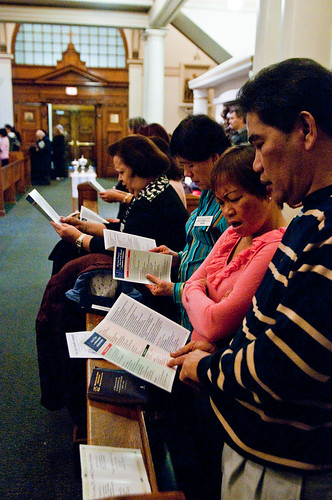 |
| People using a prayer aid: our reality the next few months |
Finishing our series on the New Roman Missal, we turn our attention to the prayers surrounding our reception of Jesus in the Eucharist. Even though I knew the change was happening, the degree of change in the Eucharistic Prayer really caught my attention. Below we'll take a look at a few of the different prayers prayed by the priest and the assembly.
Hosts ≠ wafer
We've been praying the revised Holy, Holy, Holy for a few months now in song. There's only one minor change. Instead of being a "God of power and might," we now pray that God is a "God of hosts." Ask any second grader preparing for First Communion and they'll tell you host means wafer, but that's not the cast. Here, hosts means a multitude of angelic beings.
As with many of the changes, "hosts" is a direct allusion from Scripture, this time Isaiah 6:3:
One [angel] cried out to the other:
“Holy, holy, holy is the LORD of hosts!
All the earth is filled with his glory!”
Sounds familiar? Here, the prophet Isaiah is having a vision of God sitting on a thrown on high surrounded by angels (whose name literally means messenger). Having dwelt with God, the angels should know a thing or two about God, so their proclamation that God is holy should be taken seriously. And just before this prayer, the priest invites us to join the heavenly choirs of angels in praising God. When we do this, we're uniting our voices not only to their voices, but the voices of countless generations of Jews and Christians who have acclaimed the holiness of God through multiple millennia. Our prayer and worship of God becomes united to the prayer and worship of all those saints and angels. What a truly awesome experience!
Chalice not cup
The best summary I've found of change from cup to chalice is found in the Life Teen video for Parents, the same one I posted previously. Below is that video linked up to the time where he talks the shift (the explanation is less than one minute).
As an aside, the change from cup to chalice reminds me of the fictional Indiana Jones scene where Dr. Jones is picking the Holy Grail, believed to be the true cup of Christ (he chose poorly, he chose wisely). Even though the vessel the poor man chose looks more ornate than the vessel Dr. Jones picked, Indy's choice does look like the chalices we use at ST. MARK.
Is many less than all?
One of the more controversial changes was the decision to translation the Latin word pro multis from "all," as in the previous translation, to "many." Does this mean Jesus didn't die for less than all, because many is less than all? No.
The official US Conference of Catholic Bishop's website provides a very helpful FAQs about this translation. Below is an excerpt from the FAQs:
Does this mean that Christ did not die for everyone?
 |
| We believe Jesus died for all |
No. It is a dogmatic teaching of the Church that Christ died on the Cross for all men and women (cf. John 11:52; 2 Corinthians 5:14-15; Titus 2:11; 1 John 2:2). The expression “for many,” while remaining open to the inclusion of each human person, is reflective also of the fact that this salvation is not brought about in some mechanistic way, without one’s own willing or participation; rather, the believer is invited to accept in faith the gift that is being offered and to receive the supernatural life that is given to those who participate in this mystery, living it out in their lives as well so as to be numbered among the “many” to whom the text refers.
What is the significance of “for many” in this context and in the context of the Gospel?
With these words, Jesus identifies his mission to bring salvation through his Passion and Death, his offering of himself for others. In a particular way he identifies himself with the Suffering Servant of the Prophet Isaiah, who suffers to “take away the sins of many” (Is 53:12).
Again, this shift focuses on harmony with our biblical texts. Matthew 26: 26-28 says (emphasis added):
While they were eating, Jesus took bread, said the blessing, broke it, and giving it to his disciples said, “Take and eat; this is my body.” Then he took a cup, gave thanks, and gave it to them, saying, “Drink from it, all of you, for this is my blood of the covenant, which will be shed on behalf of many for the forgiveness of sins.Enter under my roof
Like many of the revisions, when we pray "Lord, I am not worthy that you should enter under my roof, but only say the word and my souls will be healed," we're alluding to Scripture. If you're unfamiliar with the story of the centurion, there's a brief recap below:
When he entered Capernaum, a centurion approached him and appealed to him, saying, “Lord, my servant is lying at home paralyzed, suffering dreadfully.” He said to him, “I will come and cure him.” The centurion said in reply, “Lord, I am not worthy to have you enter under my roof; only say the word and my servant will be healed.” When Jesus heard this, he was amazed and said to those following him, “Amen, I say to you, in no one in Israel have I found such faith.” -- Matthew 8:5-8, 10Swap servant for soul and we quote Scripture directly. When we pray this prayer, we're placing ourselves in the shoes of the centurion who showed great faith. And we're hearing from Jesus about how great our faith is "as you have believed, let it be done for you" (Matthew 8:13).
We're all searching for healing in life. Others hurt us and we hurt others. Words, actions, inactions, thoughts, social systems, our complacency: we are a world in need of a savior, in need of a healer. Jesus is that healer. When we say "roof" we're not talking about the roof of our mouth. Instead, we're praying that because of our unworthiness, because of our sinfulness, we feel unworthy to have Jesus enter into the house that is our heart, our soul. May Jesus continue to heal us as individuals and as community!
photo credit: michael_swan; Bruce Guenter
No comments:
Post a Comment
What do you think?